Research Methods: An Introductory Guide to Social Science Research
VerifiedAdded on 2023/05/10
|19
|6305
|227
Report
AI Summary
This report serves as a brief introduction to research methods, beginning with an overview of the scientific method and its application. It explores deductive and inductive reasoning, contrasting the approaches used in natural and social sciences. The report then delves into the philosophical debate between positivism and interpretivism, highlighting their differing perspectives on objectivity and the role of the researcher. It also provides concise explanations of various research philosophies, including grounded theory, phenomenology, and ethnography. The report aims to provide a foundational understanding of research methodologies commonly used in social science, making it a valuable resource for students undertaking research projects.
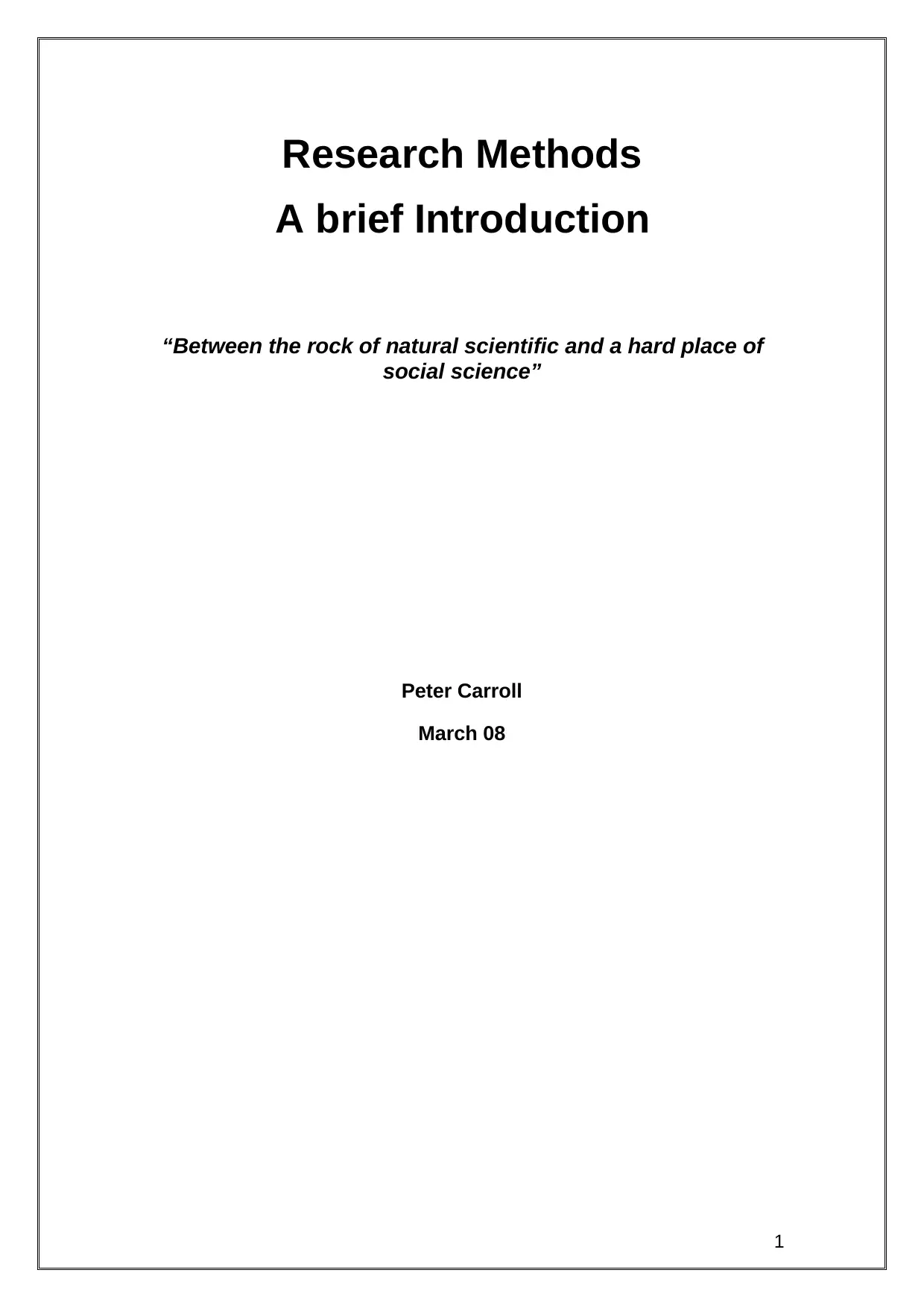
1
Research Methods
A brief Introduction
“Between the rock of natural scientific and a hard place of
social science”
Peter Carroll
March 08
Research Methods
A brief Introduction
“Between the rock of natural scientific and a hard place of
social science”
Peter Carroll
March 08
Paraphrase This Document
Need a fresh take? Get an instant paraphrase of this document with our AI Paraphraser
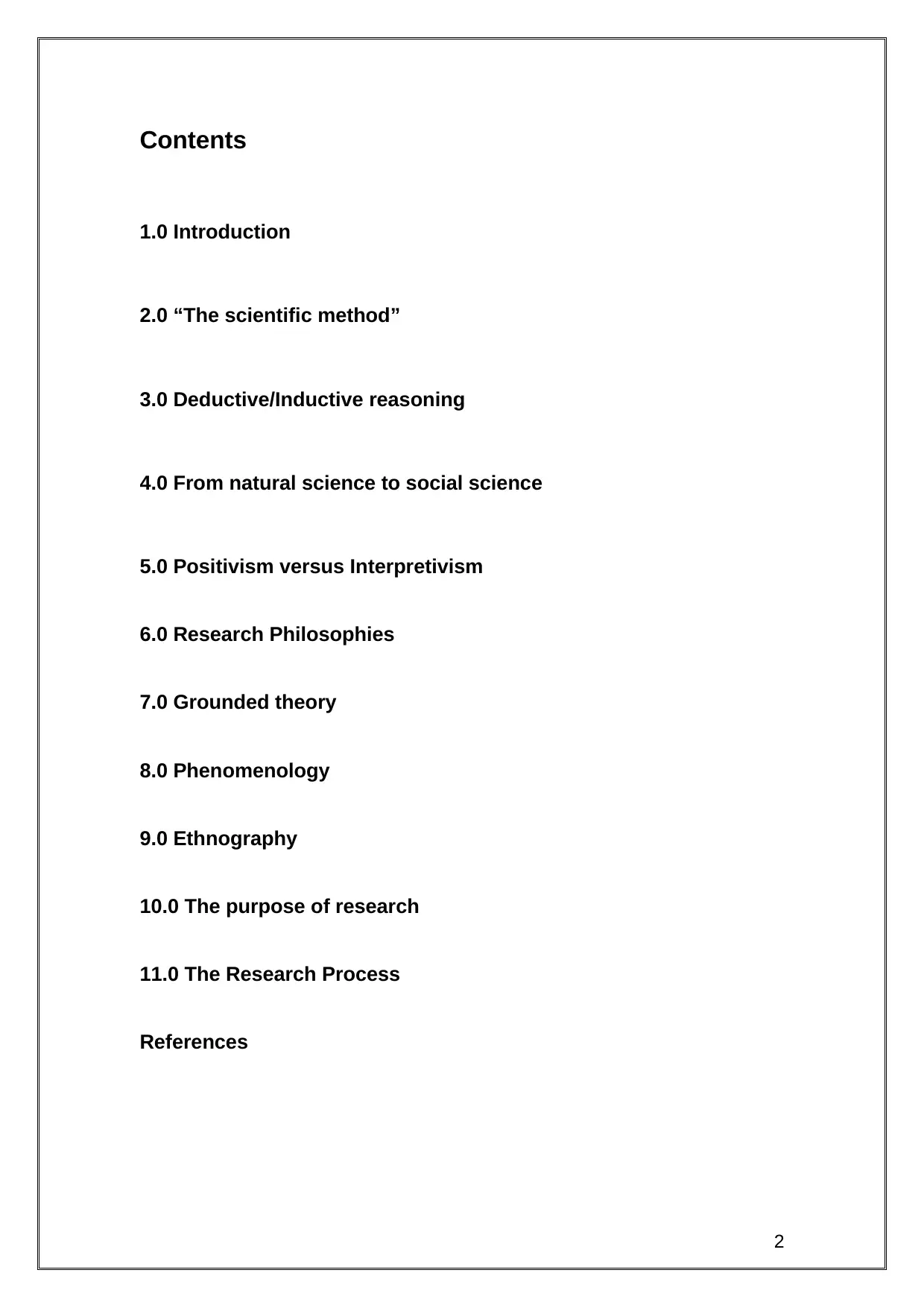
2
Contents
1.0 Introduction
2.0 “The scientific method”
3.0 Deductive/Inductive reasoning
4.0 From natural science to social science
5.0 Positivism versus Interpretivism
6.0 Research Philosophies
7.0 Grounded theory
8.0 Phenomenology
9.0 Ethnography
10.0 The purpose of research
11.0 The Research Process
References
Contents
1.0 Introduction
2.0 “The scientific method”
3.0 Deductive/Inductive reasoning
4.0 From natural science to social science
5.0 Positivism versus Interpretivism
6.0 Research Philosophies
7.0 Grounded theory
8.0 Phenomenology
9.0 Ethnography
10.0 The purpose of research
11.0 The Research Process
References
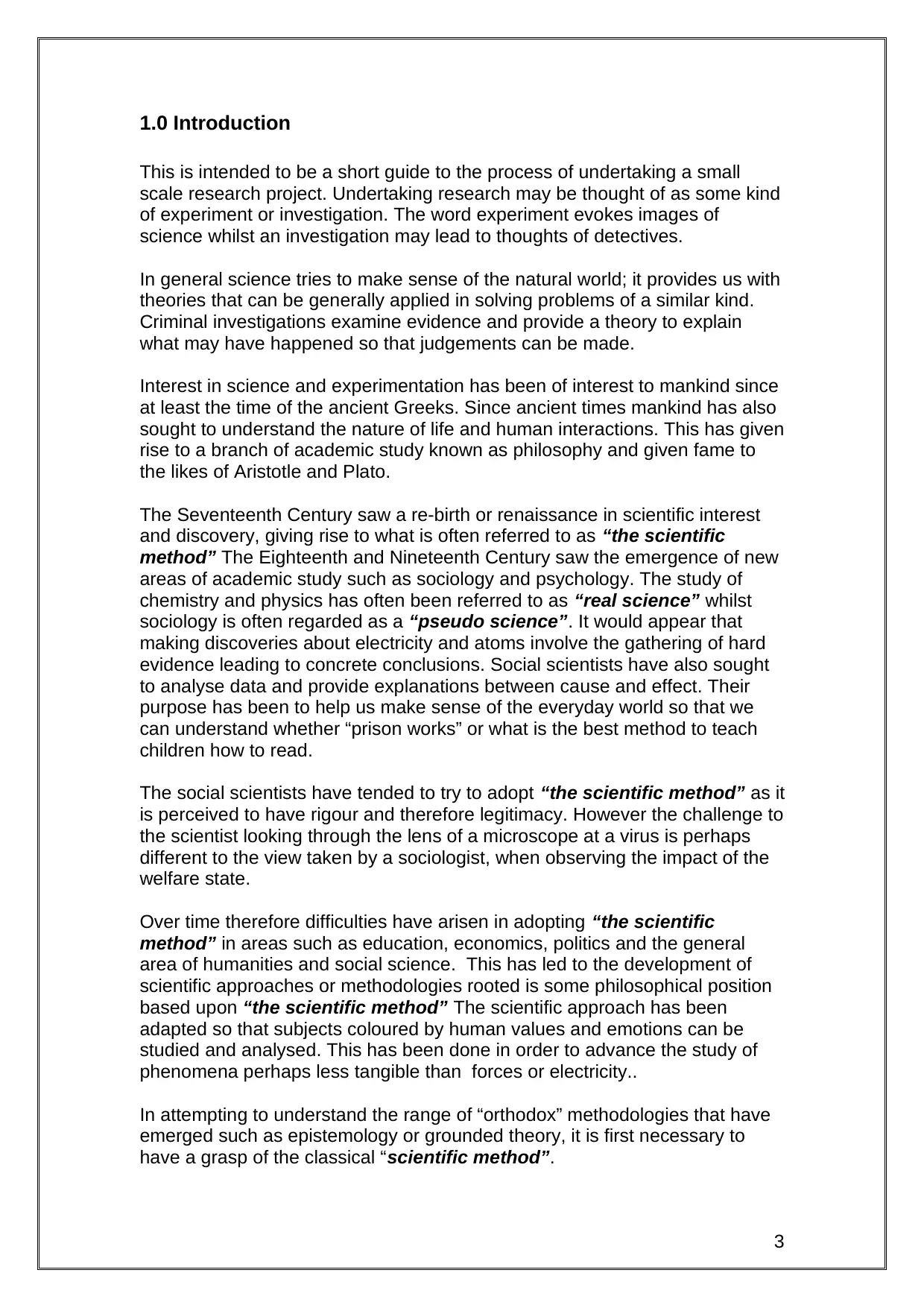
3
1.0 Introduction
This is intended to be a short guide to the process of undertaking a small
scale research project. Undertaking research may be thought of as some kind
of experiment or investigation. The word experiment evokes images of
science whilst an investigation may lead to thoughts of detectives.
In general science tries to make sense of the natural world; it provides us with
theories that can be generally applied in solving problems of a similar kind.
Criminal investigations examine evidence and provide a theory to explain
what may have happened so that judgements can be made.
Interest in science and experimentation has been of interest to mankind since
at least the time of the ancient Greeks. Since ancient times mankind has also
sought to understand the nature of life and human interactions. This has given
rise to a branch of academic study known as philosophy and given fame to
the likes of Aristotle and Plato.
The Seventeenth Century saw a re-birth or renaissance in scientific interest
and discovery, giving rise to what is often referred to as “the scientific
method” The Eighteenth and Nineteenth Century saw the emergence of new
areas of academic study such as sociology and psychology. The study of
chemistry and physics has often been referred to as “real science” whilst
sociology is often regarded as a “pseudo science”. It would appear that
making discoveries about electricity and atoms involve the gathering of hard
evidence leading to concrete conclusions. Social scientists have also sought
to analyse data and provide explanations between cause and effect. Their
purpose has been to help us make sense of the everyday world so that we
can understand whether “prison works” or what is the best method to teach
children how to read.
The social scientists have tended to try to adopt “the scientific method” as it
is perceived to have rigour and therefore legitimacy. However the challenge to
the scientist looking through the lens of a microscope at a virus is perhaps
different to the view taken by a sociologist, when observing the impact of the
welfare state.
Over time therefore difficulties have arisen in adopting “the scientific
method” in areas such as education, economics, politics and the general
area of humanities and social science. This has led to the development of
scientific approaches or methodologies rooted is some philosophical position
based upon “the scientific method” The scientific approach has been
adapted so that subjects coloured by human values and emotions can be
studied and analysed. This has been done in order to advance the study of
phenomena perhaps less tangible than forces or electricity..
In attempting to understand the range of “orthodox” methodologies that have
emerged such as epistemology or grounded theory, it is first necessary to
have a grasp of the classical “scientific method”.
1.0 Introduction
This is intended to be a short guide to the process of undertaking a small
scale research project. Undertaking research may be thought of as some kind
of experiment or investigation. The word experiment evokes images of
science whilst an investigation may lead to thoughts of detectives.
In general science tries to make sense of the natural world; it provides us with
theories that can be generally applied in solving problems of a similar kind.
Criminal investigations examine evidence and provide a theory to explain
what may have happened so that judgements can be made.
Interest in science and experimentation has been of interest to mankind since
at least the time of the ancient Greeks. Since ancient times mankind has also
sought to understand the nature of life and human interactions. This has given
rise to a branch of academic study known as philosophy and given fame to
the likes of Aristotle and Plato.
The Seventeenth Century saw a re-birth or renaissance in scientific interest
and discovery, giving rise to what is often referred to as “the scientific
method” The Eighteenth and Nineteenth Century saw the emergence of new
areas of academic study such as sociology and psychology. The study of
chemistry and physics has often been referred to as “real science” whilst
sociology is often regarded as a “pseudo science”. It would appear that
making discoveries about electricity and atoms involve the gathering of hard
evidence leading to concrete conclusions. Social scientists have also sought
to analyse data and provide explanations between cause and effect. Their
purpose has been to help us make sense of the everyday world so that we
can understand whether “prison works” or what is the best method to teach
children how to read.
The social scientists have tended to try to adopt “the scientific method” as it
is perceived to have rigour and therefore legitimacy. However the challenge to
the scientist looking through the lens of a microscope at a virus is perhaps
different to the view taken by a sociologist, when observing the impact of the
welfare state.
Over time therefore difficulties have arisen in adopting “the scientific
method” in areas such as education, economics, politics and the general
area of humanities and social science. This has led to the development of
scientific approaches or methodologies rooted is some philosophical position
based upon “the scientific method” The scientific approach has been
adapted so that subjects coloured by human values and emotions can be
studied and analysed. This has been done in order to advance the study of
phenomena perhaps less tangible than forces or electricity..
In attempting to understand the range of “orthodox” methodologies that have
emerged such as epistemology or grounded theory, it is first necessary to
have a grasp of the classical “scientific method”.
⊘ This is a preview!⊘
Do you want full access?
Subscribe today to unlock all pages.

Trusted by 1+ million students worldwide
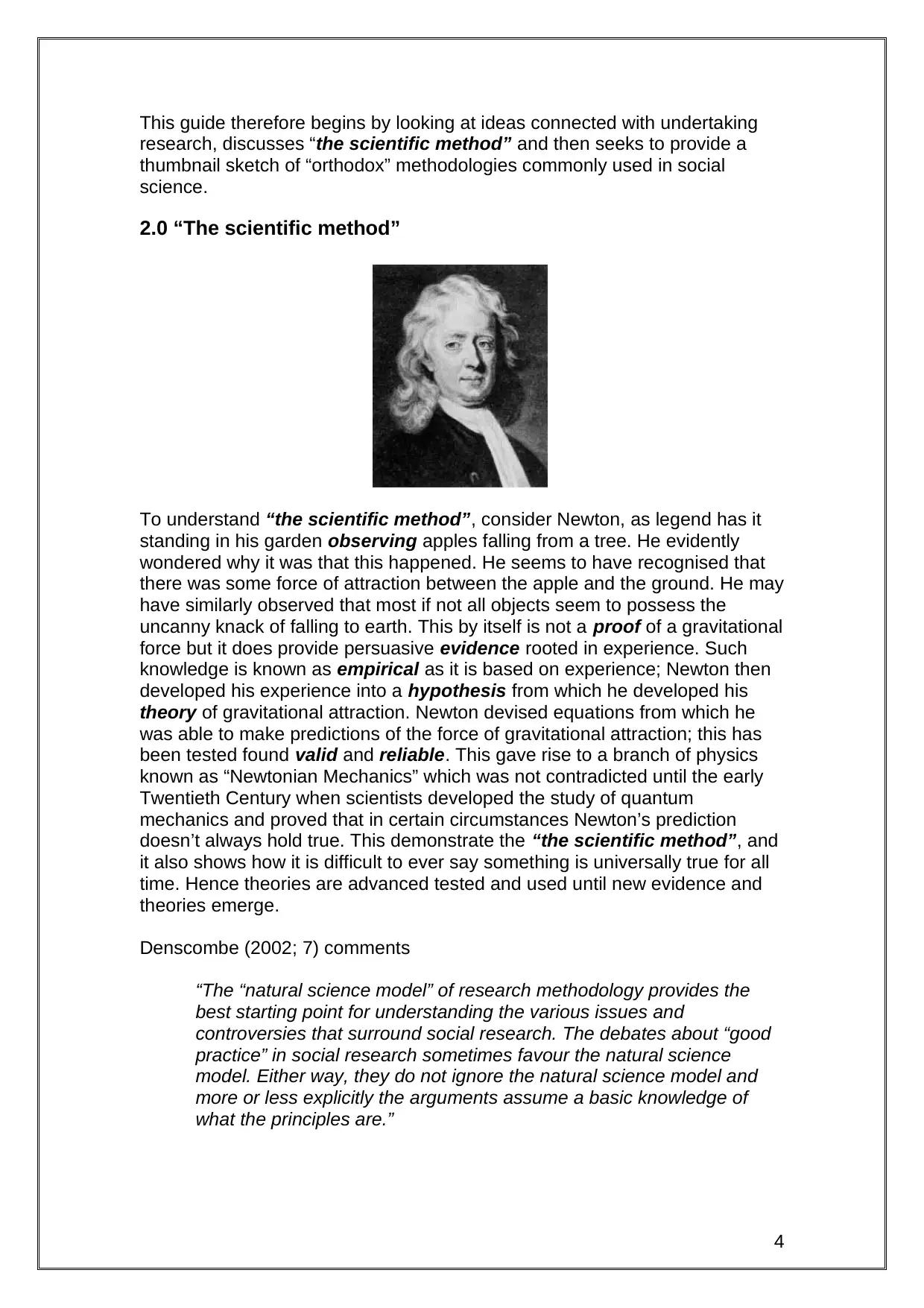
4
This guide therefore begins by looking at ideas connected with undertaking
research, discusses “the scientific method” and then seeks to provide a
thumbnail sketch of “orthodox” methodologies commonly used in social
science.
2.0 “The scientific method”
To understand “the scientific method”, consider Newton, as legend has it
standing in his garden observing apples falling from a tree. He evidently
wondered why it was that this happened. He seems to have recognised that
there was some force of attraction between the apple and the ground. He may
have similarly observed that most if not all objects seem to possess the
uncanny knack of falling to earth. This by itself is not a proof of a gravitational
force but it does provide persuasive evidence rooted in experience. Such
knowledge is known as empirical as it is based on experience; Newton then
developed his experience into a hypothesis from which he developed his
theory of gravitational attraction. Newton devised equations from which he
was able to make predictions of the force of gravitational attraction; this has
been tested found valid and reliable. This gave rise to a branch of physics
known as “Newtonian Mechanics” which was not contradicted until the early
Twentieth Century when scientists developed the study of quantum
mechanics and proved that in certain circumstances Newton’s prediction
doesn’t always hold true. This demonstrate the “the scientific method”, and
it also shows how it is difficult to ever say something is universally true for all
time. Hence theories are advanced tested and used until new evidence and
theories emerge.
Denscombe (2002; 7) comments
“The “natural science model” of research methodology provides the
best starting point for understanding the various issues and
controversies that surround social research. The debates about “good
practice” in social research sometimes favour the natural science
model. Either way, they do not ignore the natural science model and
more or less explicitly the arguments assume a basic knowledge of
what the principles are.”
This guide therefore begins by looking at ideas connected with undertaking
research, discusses “the scientific method” and then seeks to provide a
thumbnail sketch of “orthodox” methodologies commonly used in social
science.
2.0 “The scientific method”
To understand “the scientific method”, consider Newton, as legend has it
standing in his garden observing apples falling from a tree. He evidently
wondered why it was that this happened. He seems to have recognised that
there was some force of attraction between the apple and the ground. He may
have similarly observed that most if not all objects seem to possess the
uncanny knack of falling to earth. This by itself is not a proof of a gravitational
force but it does provide persuasive evidence rooted in experience. Such
knowledge is known as empirical as it is based on experience; Newton then
developed his experience into a hypothesis from which he developed his
theory of gravitational attraction. Newton devised equations from which he
was able to make predictions of the force of gravitational attraction; this has
been tested found valid and reliable. This gave rise to a branch of physics
known as “Newtonian Mechanics” which was not contradicted until the early
Twentieth Century when scientists developed the study of quantum
mechanics and proved that in certain circumstances Newton’s prediction
doesn’t always hold true. This demonstrate the “the scientific method”, and
it also shows how it is difficult to ever say something is universally true for all
time. Hence theories are advanced tested and used until new evidence and
theories emerge.
Denscombe (2002; 7) comments
“The “natural science model” of research methodology provides the
best starting point for understanding the various issues and
controversies that surround social research. The debates about “good
practice” in social research sometimes favour the natural science
model. Either way, they do not ignore the natural science model and
more or less explicitly the arguments assume a basic knowledge of
what the principles are.”
Paraphrase This Document
Need a fresh take? Get an instant paraphrase of this document with our AI Paraphraser
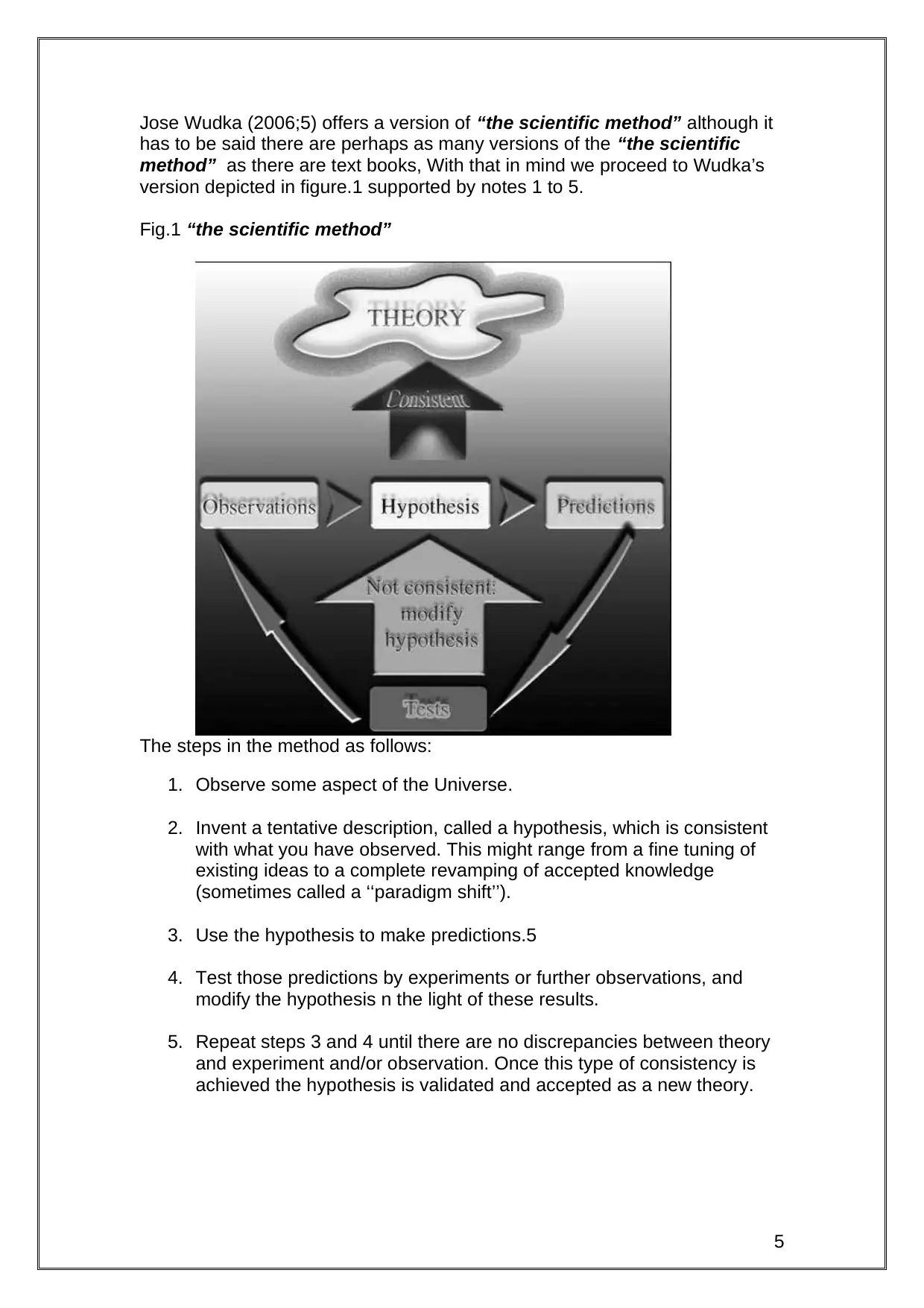
5
Jose Wudka (2006;5) offers a version of “the scientific method” although it
has to be said there are perhaps as many versions of the “the scientific
method” as there are text books, With that in mind we proceed to Wudka’s
version depicted in figure.1 supported by notes 1 to 5.
Fig.1 “the scientific method”
The steps in the method as follows:
1. Observe some aspect of the Universe.
2. Invent a tentative description, called a hypothesis, which is consistent
with what you have observed. This might range from a fine tuning of
existing ideas to a complete revamping of accepted knowledge
(sometimes called a ‘‘paradigm shift’’).
3. Use the hypothesis to make predictions.5
4. Test those predictions by experiments or further observations, and
modify the hypothesis n the light of these results.
5. Repeat steps 3 and 4 until there are no discrepancies between theory
and experiment and/or observation. Once this type of consistency is
achieved the hypothesis is validated and accepted as a new theory.
Jose Wudka (2006;5) offers a version of “the scientific method” although it
has to be said there are perhaps as many versions of the “the scientific
method” as there are text books, With that in mind we proceed to Wudka’s
version depicted in figure.1 supported by notes 1 to 5.
Fig.1 “the scientific method”
The steps in the method as follows:
1. Observe some aspect of the Universe.
2. Invent a tentative description, called a hypothesis, which is consistent
with what you have observed. This might range from a fine tuning of
existing ideas to a complete revamping of accepted knowledge
(sometimes called a ‘‘paradigm shift’’).
3. Use the hypothesis to make predictions.5
4. Test those predictions by experiments or further observations, and
modify the hypothesis n the light of these results.
5. Repeat steps 3 and 4 until there are no discrepancies between theory
and experiment and/or observation. Once this type of consistency is
achieved the hypothesis is validated and accepted as a new theory.
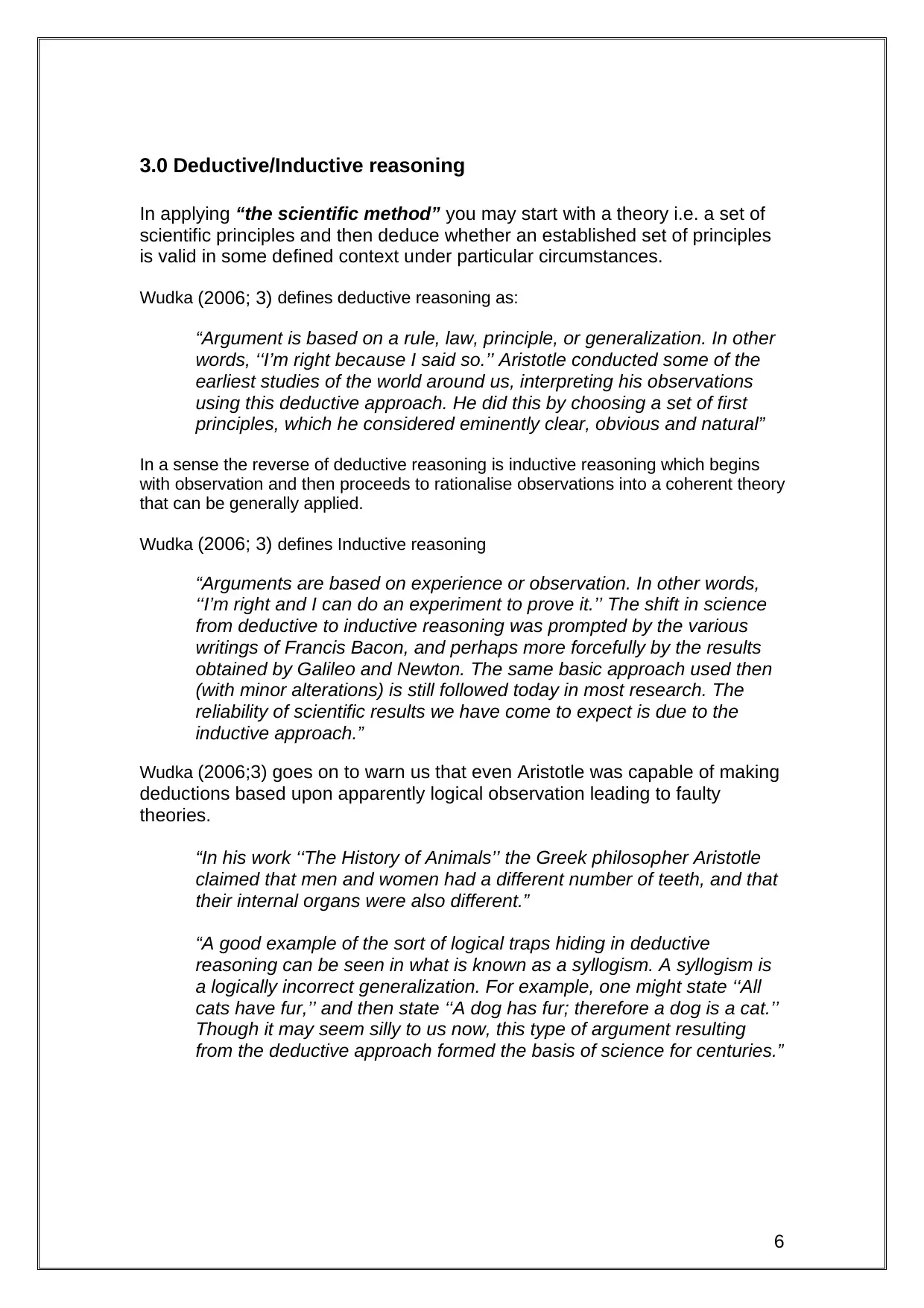
6
3.0 Deductive/Inductive reasoning
In applying “the scientific method” you may start with a theory i.e. a set of
scientific principles and then deduce whether an established set of principles
is valid in some defined context under particular circumstances.
Wudka (2006; 3) defines deductive reasoning as:
“Argument is based on a rule, law, principle, or generalization. In other
words, ‘‘I’m right because I said so.’’ Aristotle conducted some of the
earliest studies of the world around us, interpreting his observations
using this deductive approach. He did this by choosing a set of first
principles, which he considered eminently clear, obvious and natural”
In a sense the reverse of deductive reasoning is inductive reasoning which begins
with observation and then proceeds to rationalise observations into a coherent theory
that can be generally applied.
Wudka (2006; 3) defines Inductive reasoning
“Arguments are based on experience or observation. In other words,
‘‘I’m right and I can do an experiment to prove it.’’ The shift in science
from deductive to inductive reasoning was prompted by the various
writings of Francis Bacon, and perhaps more forcefully by the results
obtained by Galileo and Newton. The same basic approach used then
(with minor alterations) is still followed today in most research. The
reliability of scientific results we have come to expect is due to the
inductive approach.”
Wudka (2006;3) goes on to warn us that even Aristotle was capable of making
deductions based upon apparently logical observation leading to faulty
theories.
“In his work ‘‘The History of Animals’’ the Greek philosopher Aristotle
claimed that men and women had a different number of teeth, and that
their internal organs were also different.”
“A good example of the sort of logical traps hiding in deductive
reasoning can be seen in what is known as a syllogism. A syllogism is
a logically incorrect generalization. For example, one might state ‘‘All
cats have fur,’’ and then state ‘‘A dog has fur; therefore a dog is a cat.’’
Though it may seem silly to us now, this type of argument resulting
from the deductive approach formed the basis of science for centuries.”
3.0 Deductive/Inductive reasoning
In applying “the scientific method” you may start with a theory i.e. a set of
scientific principles and then deduce whether an established set of principles
is valid in some defined context under particular circumstances.
Wudka (2006; 3) defines deductive reasoning as:
“Argument is based on a rule, law, principle, or generalization. In other
words, ‘‘I’m right because I said so.’’ Aristotle conducted some of the
earliest studies of the world around us, interpreting his observations
using this deductive approach. He did this by choosing a set of first
principles, which he considered eminently clear, obvious and natural”
In a sense the reverse of deductive reasoning is inductive reasoning which begins
with observation and then proceeds to rationalise observations into a coherent theory
that can be generally applied.
Wudka (2006; 3) defines Inductive reasoning
“Arguments are based on experience or observation. In other words,
‘‘I’m right and I can do an experiment to prove it.’’ The shift in science
from deductive to inductive reasoning was prompted by the various
writings of Francis Bacon, and perhaps more forcefully by the results
obtained by Galileo and Newton. The same basic approach used then
(with minor alterations) is still followed today in most research. The
reliability of scientific results we have come to expect is due to the
inductive approach.”
Wudka (2006;3) goes on to warn us that even Aristotle was capable of making
deductions based upon apparently logical observation leading to faulty
theories.
“In his work ‘‘The History of Animals’’ the Greek philosopher Aristotle
claimed that men and women had a different number of teeth, and that
their internal organs were also different.”
“A good example of the sort of logical traps hiding in deductive
reasoning can be seen in what is known as a syllogism. A syllogism is
a logically incorrect generalization. For example, one might state ‘‘All
cats have fur,’’ and then state ‘‘A dog has fur; therefore a dog is a cat.’’
Though it may seem silly to us now, this type of argument resulting
from the deductive approach formed the basis of science for centuries.”
⊘ This is a preview!⊘
Do you want full access?
Subscribe today to unlock all pages.

Trusted by 1+ million students worldwide
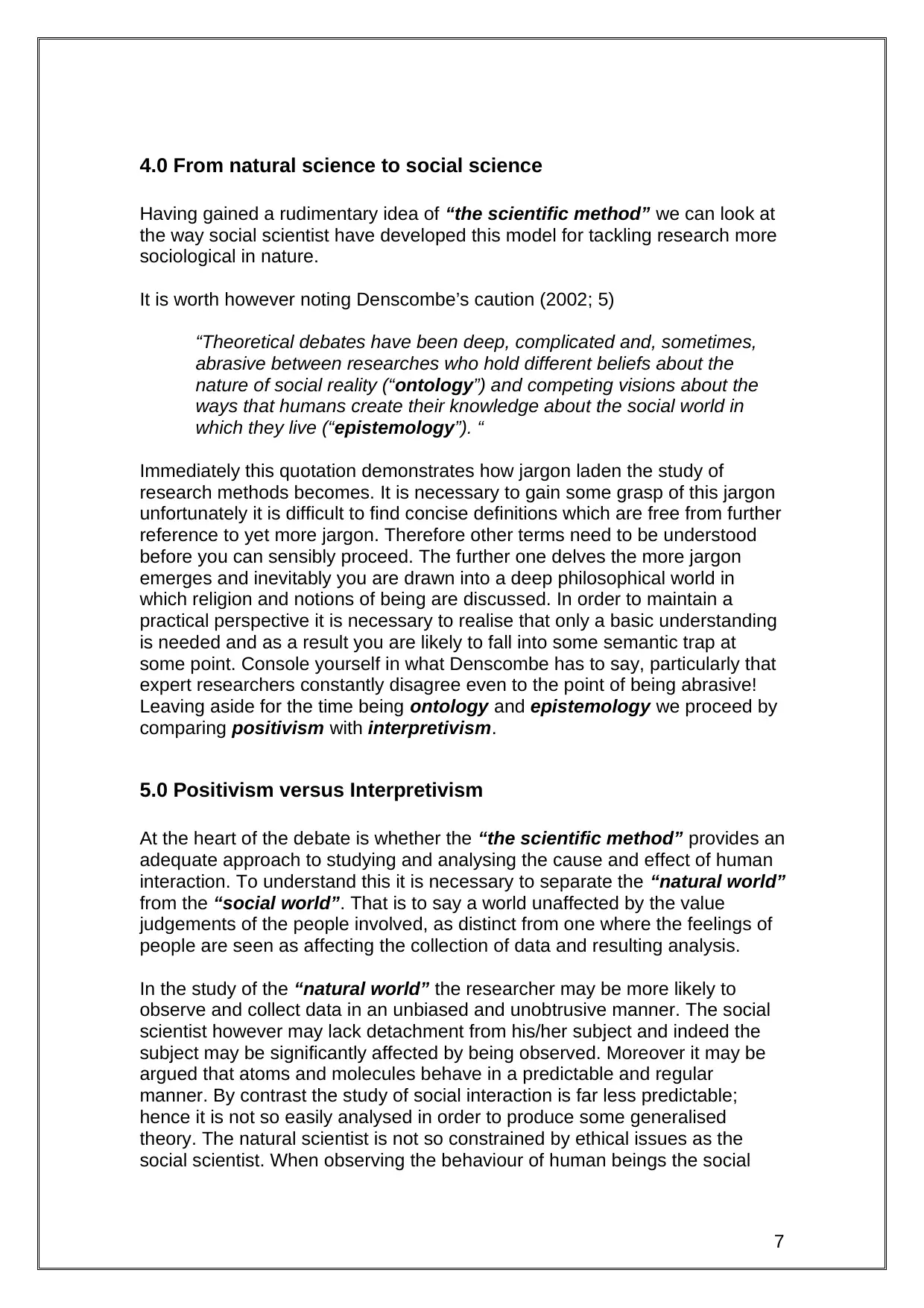
7
4.0 From natural science to social science
Having gained a rudimentary idea of “the scientific method” we can look at
the way social scientist have developed this model for tackling research more
sociological in nature.
It is worth however noting Denscombe’s caution (2002; 5)
“Theoretical debates have been deep, complicated and, sometimes,
abrasive between researches who hold different beliefs about the
nature of social reality (“ontology”) and competing visions about the
ways that humans create their knowledge about the social world in
which they live (“epistemology”). “
Immediately this quotation demonstrates how jargon laden the study of
research methods becomes. It is necessary to gain some grasp of this jargon
unfortunately it is difficult to find concise definitions which are free from further
reference to yet more jargon. Therefore other terms need to be understood
before you can sensibly proceed. The further one delves the more jargon
emerges and inevitably you are drawn into a deep philosophical world in
which religion and notions of being are discussed. In order to maintain a
practical perspective it is necessary to realise that only a basic understanding
is needed and as a result you are likely to fall into some semantic trap at
some point. Console yourself in what Denscombe has to say, particularly that
expert researchers constantly disagree even to the point of being abrasive!
Leaving aside for the time being ontology and epistemology we proceed by
comparing positivism with interpretivism.
5.0 Positivism versus Interpretivism
At the heart of the debate is whether the “the scientific method” provides an
adequate approach to studying and analysing the cause and effect of human
interaction. To understand this it is necessary to separate the “natural world”
from the “social world”. That is to say a world unaffected by the value
judgements of the people involved, as distinct from one where the feelings of
people are seen as affecting the collection of data and resulting analysis.
In the study of the “natural world” the researcher may be more likely to
observe and collect data in an unbiased and unobtrusive manner. The social
scientist however may lack detachment from his/her subject and indeed the
subject may be significantly affected by being observed. Moreover it may be
argued that atoms and molecules behave in a predictable and regular
manner. By contrast the study of social interaction is far less predictable;
hence it is not so easily analysed in order to produce some generalised
theory. The natural scientist is not so constrained by ethical issues as the
social scientist. When observing the behaviour of human beings the social
4.0 From natural science to social science
Having gained a rudimentary idea of “the scientific method” we can look at
the way social scientist have developed this model for tackling research more
sociological in nature.
It is worth however noting Denscombe’s caution (2002; 5)
“Theoretical debates have been deep, complicated and, sometimes,
abrasive between researches who hold different beliefs about the
nature of social reality (“ontology”) and competing visions about the
ways that humans create their knowledge about the social world in
which they live (“epistemology”). “
Immediately this quotation demonstrates how jargon laden the study of
research methods becomes. It is necessary to gain some grasp of this jargon
unfortunately it is difficult to find concise definitions which are free from further
reference to yet more jargon. Therefore other terms need to be understood
before you can sensibly proceed. The further one delves the more jargon
emerges and inevitably you are drawn into a deep philosophical world in
which religion and notions of being are discussed. In order to maintain a
practical perspective it is necessary to realise that only a basic understanding
is needed and as a result you are likely to fall into some semantic trap at
some point. Console yourself in what Denscombe has to say, particularly that
expert researchers constantly disagree even to the point of being abrasive!
Leaving aside for the time being ontology and epistemology we proceed by
comparing positivism with interpretivism.
5.0 Positivism versus Interpretivism
At the heart of the debate is whether the “the scientific method” provides an
adequate approach to studying and analysing the cause and effect of human
interaction. To understand this it is necessary to separate the “natural world”
from the “social world”. That is to say a world unaffected by the value
judgements of the people involved, as distinct from one where the feelings of
people are seen as affecting the collection of data and resulting analysis.
In the study of the “natural world” the researcher may be more likely to
observe and collect data in an unbiased and unobtrusive manner. The social
scientist however may lack detachment from his/her subject and indeed the
subject may be significantly affected by being observed. Moreover it may be
argued that atoms and molecules behave in a predictable and regular
manner. By contrast the study of social interaction is far less predictable;
hence it is not so easily analysed in order to produce some generalised
theory. The natural scientist is not so constrained by ethical issues as the
social scientist. When observing the behaviour of human beings the social
Paraphrase This Document
Need a fresh take? Get an instant paraphrase of this document with our AI Paraphraser
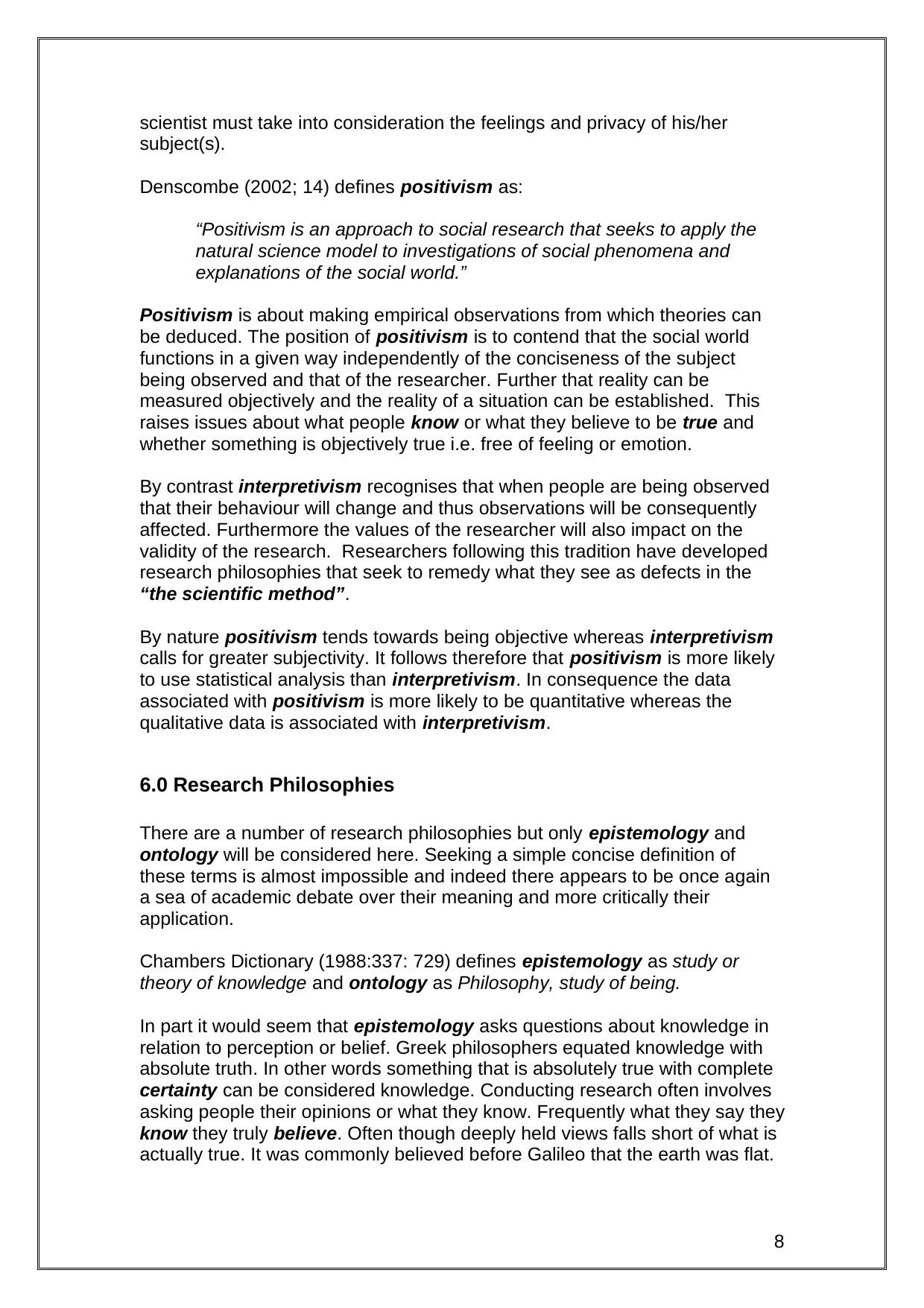
8
scientist must take into consideration the feelings and privacy of his/her
subject(s).
Denscombe (2002; 14) defines positivism as:
“Positivism is an approach to social research that seeks to apply the
natural science model to investigations of social phenomena and
explanations of the social world.”
Positivism is about making empirical observations from which theories can
be deduced. The position of positivism is to contend that the social world
functions in a given way independently of the conciseness of the subject
being observed and that of the researcher. Further that reality can be
measured objectively and the reality of a situation can be established. This
raises issues about what people know or what they believe to be true and
whether something is objectively true i.e. free of feeling or emotion.
By contrast interpretivism recognises that when people are being observed
that their behaviour will change and thus observations will be consequently
affected. Furthermore the values of the researcher will also impact on the
validity of the research. Researchers following this tradition have developed
research philosophies that seek to remedy what they see as defects in the
“the scientific method”.
By nature positivism tends towards being objective whereas interpretivism
calls for greater subjectivity. It follows therefore that positivism is more likely
to use statistical analysis than interpretivism. In consequence the data
associated with positivism is more likely to be quantitative whereas the
qualitative data is associated with interpretivism.
6.0 Research Philosophies
There are a number of research philosophies but only epistemology and
ontology will be considered here. Seeking a simple concise definition of
these terms is almost impossible and indeed there appears to be once again
a sea of academic debate over their meaning and more critically their
application.
Chambers Dictionary (1988:337: 729) defines epistemology as study or
theory of knowledge and ontology as Philosophy, study of being.
In part it would seem that epistemology asks questions about knowledge in
relation to perception or belief. Greek philosophers equated knowledge with
absolute truth. In other words something that is absolutely true with complete
certainty can be considered knowledge. Conducting research often involves
asking people their opinions or what they know. Frequently what they say they
know they truly believe. Often though deeply held views falls short of what is
actually true. It was commonly believed before Galileo that the earth was flat.
scientist must take into consideration the feelings and privacy of his/her
subject(s).
Denscombe (2002; 14) defines positivism as:
“Positivism is an approach to social research that seeks to apply the
natural science model to investigations of social phenomena and
explanations of the social world.”
Positivism is about making empirical observations from which theories can
be deduced. The position of positivism is to contend that the social world
functions in a given way independently of the conciseness of the subject
being observed and that of the researcher. Further that reality can be
measured objectively and the reality of a situation can be established. This
raises issues about what people know or what they believe to be true and
whether something is objectively true i.e. free of feeling or emotion.
By contrast interpretivism recognises that when people are being observed
that their behaviour will change and thus observations will be consequently
affected. Furthermore the values of the researcher will also impact on the
validity of the research. Researchers following this tradition have developed
research philosophies that seek to remedy what they see as defects in the
“the scientific method”.
By nature positivism tends towards being objective whereas interpretivism
calls for greater subjectivity. It follows therefore that positivism is more likely
to use statistical analysis than interpretivism. In consequence the data
associated with positivism is more likely to be quantitative whereas the
qualitative data is associated with interpretivism.
6.0 Research Philosophies
There are a number of research philosophies but only epistemology and
ontology will be considered here. Seeking a simple concise definition of
these terms is almost impossible and indeed there appears to be once again
a sea of academic debate over their meaning and more critically their
application.
Chambers Dictionary (1988:337: 729) defines epistemology as study or
theory of knowledge and ontology as Philosophy, study of being.
In part it would seem that epistemology asks questions about knowledge in
relation to perception or belief. Greek philosophers equated knowledge with
absolute truth. In other words something that is absolutely true with complete
certainty can be considered knowledge. Conducting research often involves
asking people their opinions or what they know. Frequently what they say they
know they truly believe. Often though deeply held views falls short of what is
actually true. It was commonly believed before Galileo that the earth was flat.
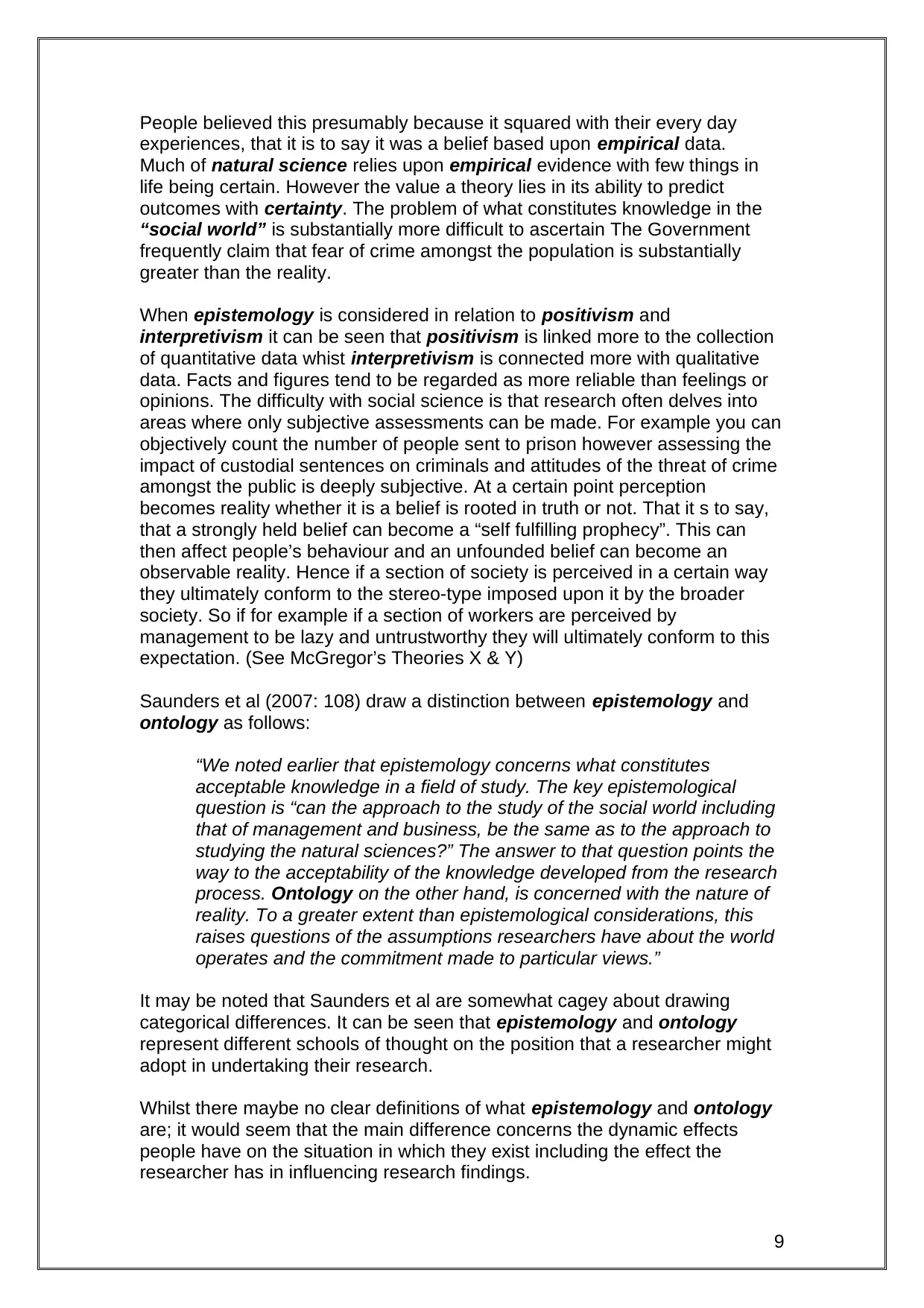
9
People believed this presumably because it squared with their every day
experiences, that it is to say it was a belief based upon empirical data.
Much of natural science relies upon empirical evidence with few things in
life being certain. However the value a theory lies in its ability to predict
outcomes with certainty. The problem of what constitutes knowledge in the
“social world” is substantially more difficult to ascertain The Government
frequently claim that fear of crime amongst the population is substantially
greater than the reality.
When epistemology is considered in relation to positivism and
interpretivism it can be seen that positivism is linked more to the collection
of quantitative data whist interpretivism is connected more with qualitative
data. Facts and figures tend to be regarded as more reliable than feelings or
opinions. The difficulty with social science is that research often delves into
areas where only subjective assessments can be made. For example you can
objectively count the number of people sent to prison however assessing the
impact of custodial sentences on criminals and attitudes of the threat of crime
amongst the public is deeply subjective. At a certain point perception
becomes reality whether it is a belief is rooted in truth or not. That it s to say,
that a strongly held belief can become a “self fulfilling prophecy”. This can
then affect people’s behaviour and an unfounded belief can become an
observable reality. Hence if a section of society is perceived in a certain way
they ultimately conform to the stereo-type imposed upon it by the broader
society. So if for example if a section of workers are perceived by
management to be lazy and untrustworthy they will ultimately conform to this
expectation. (See McGregor’s Theories X & Y)
Saunders et al (2007: 108) draw a distinction between epistemology and
ontology as follows:
“We noted earlier that epistemology concerns what constitutes
acceptable knowledge in a field of study. The key epistemological
question is “can the approach to the study of the social world including
that of management and business, be the same as to the approach to
studying the natural sciences?” The answer to that question points the
way to the acceptability of the knowledge developed from the research
process. Ontology on the other hand, is concerned with the nature of
reality. To a greater extent than epistemological considerations, this
raises questions of the assumptions researchers have about the world
operates and the commitment made to particular views.”
It may be noted that Saunders et al are somewhat cagey about drawing
categorical differences. It can be seen that epistemology and ontology
represent different schools of thought on the position that a researcher might
adopt in undertaking their research.
Whilst there maybe no clear definitions of what epistemology and ontology
are; it would seem that the main difference concerns the dynamic effects
people have on the situation in which they exist including the effect the
researcher has in influencing research findings.
People believed this presumably because it squared with their every day
experiences, that it is to say it was a belief based upon empirical data.
Much of natural science relies upon empirical evidence with few things in
life being certain. However the value a theory lies in its ability to predict
outcomes with certainty. The problem of what constitutes knowledge in the
“social world” is substantially more difficult to ascertain The Government
frequently claim that fear of crime amongst the population is substantially
greater than the reality.
When epistemology is considered in relation to positivism and
interpretivism it can be seen that positivism is linked more to the collection
of quantitative data whist interpretivism is connected more with qualitative
data. Facts and figures tend to be regarded as more reliable than feelings or
opinions. The difficulty with social science is that research often delves into
areas where only subjective assessments can be made. For example you can
objectively count the number of people sent to prison however assessing the
impact of custodial sentences on criminals and attitudes of the threat of crime
amongst the public is deeply subjective. At a certain point perception
becomes reality whether it is a belief is rooted in truth or not. That it s to say,
that a strongly held belief can become a “self fulfilling prophecy”. This can
then affect people’s behaviour and an unfounded belief can become an
observable reality. Hence if a section of society is perceived in a certain way
they ultimately conform to the stereo-type imposed upon it by the broader
society. So if for example if a section of workers are perceived by
management to be lazy and untrustworthy they will ultimately conform to this
expectation. (See McGregor’s Theories X & Y)
Saunders et al (2007: 108) draw a distinction between epistemology and
ontology as follows:
“We noted earlier that epistemology concerns what constitutes
acceptable knowledge in a field of study. The key epistemological
question is “can the approach to the study of the social world including
that of management and business, be the same as to the approach to
studying the natural sciences?” The answer to that question points the
way to the acceptability of the knowledge developed from the research
process. Ontology on the other hand, is concerned with the nature of
reality. To a greater extent than epistemological considerations, this
raises questions of the assumptions researchers have about the world
operates and the commitment made to particular views.”
It may be noted that Saunders et al are somewhat cagey about drawing
categorical differences. It can be seen that epistemology and ontology
represent different schools of thought on the position that a researcher might
adopt in undertaking their research.
Whilst there maybe no clear definitions of what epistemology and ontology
are; it would seem that the main difference concerns the dynamic effects
people have on the situation in which they exist including the effect the
researcher has in influencing research findings.
⊘ This is a preview!⊘
Do you want full access?
Subscribe today to unlock all pages.

Trusted by 1+ million students worldwide
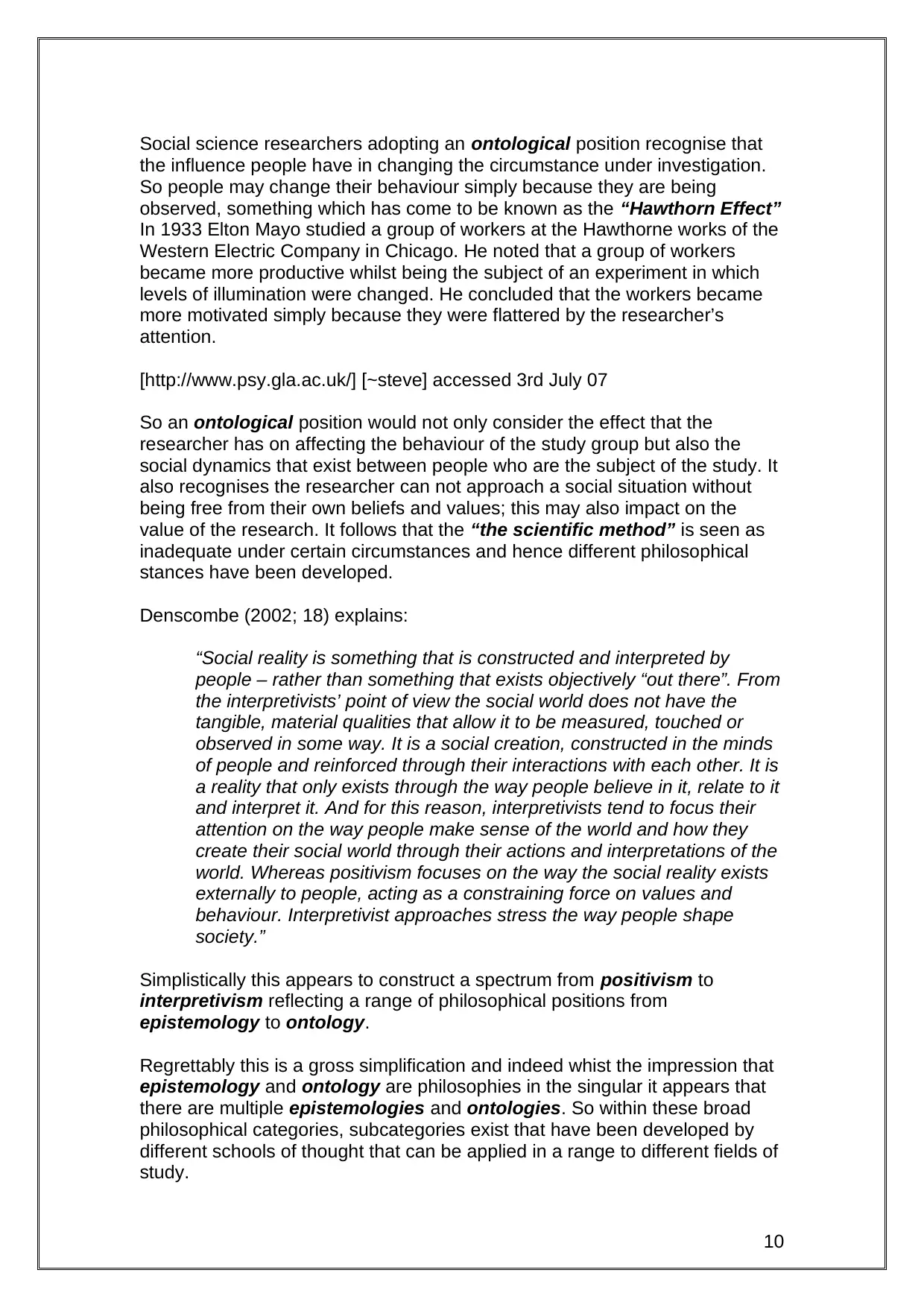
10
Social science researchers adopting an ontological position recognise that
the influence people have in changing the circumstance under investigation.
So people may change their behaviour simply because they are being
observed, something which has come to be known as the “Hawthorn Effect”
In 1933 Elton Mayo studied a group of workers at the Hawthorne works of the
Western Electric Company in Chicago. He noted that a group of workers
became more productive whilst being the subject of an experiment in which
levels of illumination were changed. He concluded that the workers became
more motivated simply because they were flattered by the researcher’s
attention.
[http://www.psy.gla.ac.uk/] [~steve] accessed 3rd July 07
So an ontological position would not only consider the effect that the
researcher has on affecting the behaviour of the study group but also the
social dynamics that exist between people who are the subject of the study. It
also recognises the researcher can not approach a social situation without
being free from their own beliefs and values; this may also impact on the
value of the research. It follows that the “the scientific method” is seen as
inadequate under certain circumstances and hence different philosophical
stances have been developed.
Denscombe (2002; 18) explains:
“Social reality is something that is constructed and interpreted by
people – rather than something that exists objectively “out there”. From
the interpretivists’ point of view the social world does not have the
tangible, material qualities that allow it to be measured, touched or
observed in some way. It is a social creation, constructed in the minds
of people and reinforced through their interactions with each other. It is
a reality that only exists through the way people believe in it, relate to it
and interpret it. And for this reason, interpretivists tend to focus their
attention on the way people make sense of the world and how they
create their social world through their actions and interpretations of the
world. Whereas positivism focuses on the way the social reality exists
externally to people, acting as a constraining force on values and
behaviour. Interpretivist approaches stress the way people shape
society.”
Simplistically this appears to construct a spectrum from positivism to
interpretivism reflecting a range of philosophical positions from
epistemology to ontology.
Regrettably this is a gross simplification and indeed whist the impression that
epistemology and ontology are philosophies in the singular it appears that
there are multiple epistemologies and ontologies. So within these broad
philosophical categories, subcategories exist that have been developed by
different schools of thought that can be applied in a range to different fields of
study.
Social science researchers adopting an ontological position recognise that
the influence people have in changing the circumstance under investigation.
So people may change their behaviour simply because they are being
observed, something which has come to be known as the “Hawthorn Effect”
In 1933 Elton Mayo studied a group of workers at the Hawthorne works of the
Western Electric Company in Chicago. He noted that a group of workers
became more productive whilst being the subject of an experiment in which
levels of illumination were changed. He concluded that the workers became
more motivated simply because they were flattered by the researcher’s
attention.
[http://www.psy.gla.ac.uk/] [~steve] accessed 3rd July 07
So an ontological position would not only consider the effect that the
researcher has on affecting the behaviour of the study group but also the
social dynamics that exist between people who are the subject of the study. It
also recognises the researcher can not approach a social situation without
being free from their own beliefs and values; this may also impact on the
value of the research. It follows that the “the scientific method” is seen as
inadequate under certain circumstances and hence different philosophical
stances have been developed.
Denscombe (2002; 18) explains:
“Social reality is something that is constructed and interpreted by
people – rather than something that exists objectively “out there”. From
the interpretivists’ point of view the social world does not have the
tangible, material qualities that allow it to be measured, touched or
observed in some way. It is a social creation, constructed in the minds
of people and reinforced through their interactions with each other. It is
a reality that only exists through the way people believe in it, relate to it
and interpret it. And for this reason, interpretivists tend to focus their
attention on the way people make sense of the world and how they
create their social world through their actions and interpretations of the
world. Whereas positivism focuses on the way the social reality exists
externally to people, acting as a constraining force on values and
behaviour. Interpretivist approaches stress the way people shape
society.”
Simplistically this appears to construct a spectrum from positivism to
interpretivism reflecting a range of philosophical positions from
epistemology to ontology.
Regrettably this is a gross simplification and indeed whist the impression that
epistemology and ontology are philosophies in the singular it appears that
there are multiple epistemologies and ontologies. So within these broad
philosophical categories, subcategories exist that have been developed by
different schools of thought that can be applied in a range to different fields of
study.
Paraphrase This Document
Need a fresh take? Get an instant paraphrase of this document with our AI Paraphraser
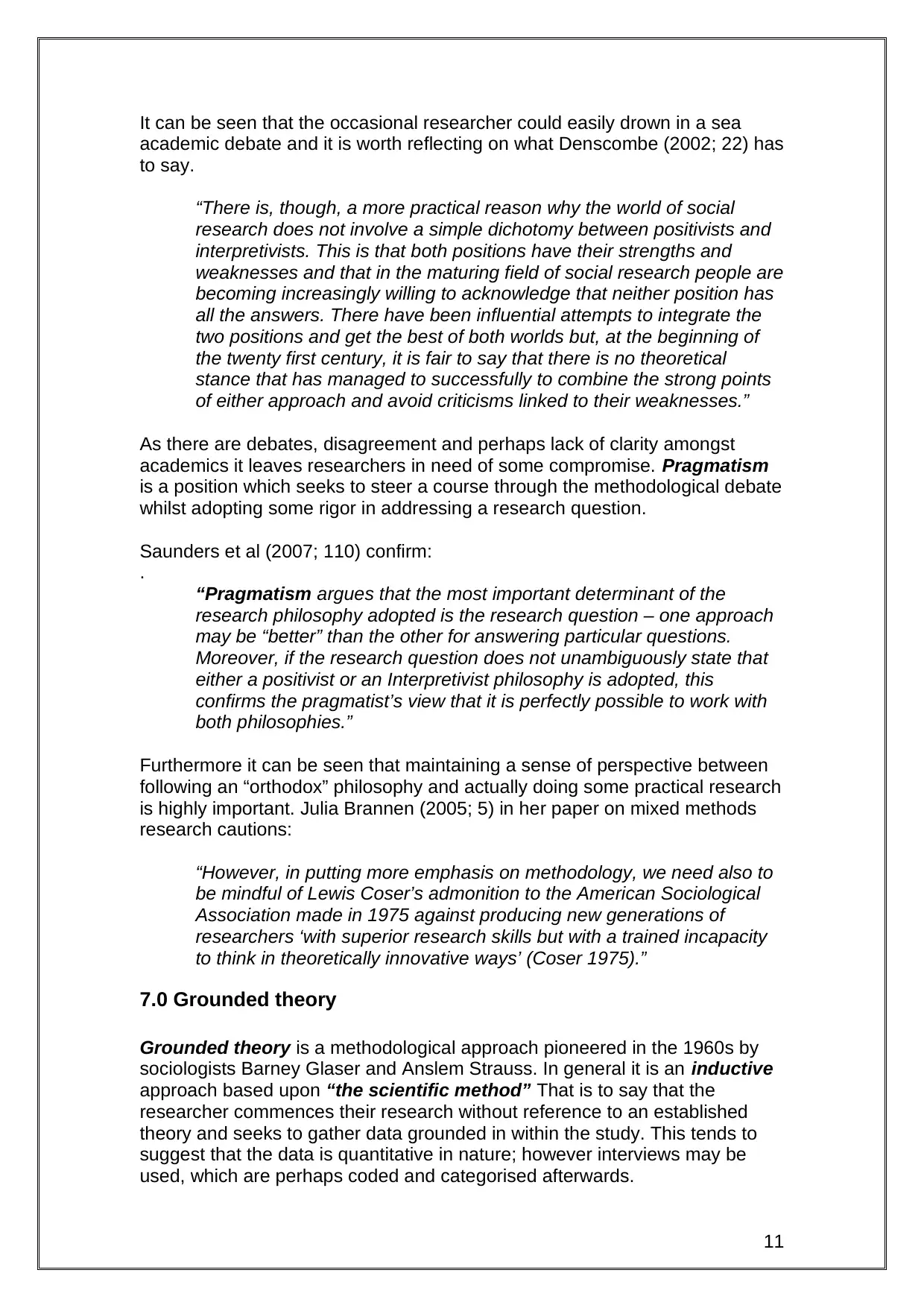
11
It can be seen that the occasional researcher could easily drown in a sea
academic debate and it is worth reflecting on what Denscombe (2002; 22) has
to say.
“There is, though, a more practical reason why the world of social
research does not involve a simple dichotomy between positivists and
interpretivists. This is that both positions have their strengths and
weaknesses and that in the maturing field of social research people are
becoming increasingly willing to acknowledge that neither position has
all the answers. There have been influential attempts to integrate the
two positions and get the best of both worlds but, at the beginning of
the twenty first century, it is fair to say that there is no theoretical
stance that has managed to successfully to combine the strong points
of either approach and avoid criticisms linked to their weaknesses.”
As there are debates, disagreement and perhaps lack of clarity amongst
academics it leaves researchers in need of some compromise. Pragmatism
is a position which seeks to steer a course through the methodological debate
whilst adopting some rigor in addressing a research question.
Saunders et al (2007; 110) confirm:
.
“Pragmatism argues that the most important determinant of the
research philosophy adopted is the research question – one approach
may be “better” than the other for answering particular questions.
Moreover, if the research question does not unambiguously state that
either a positivist or an Interpretivist philosophy is adopted, this
confirms the pragmatist’s view that it is perfectly possible to work with
both philosophies.”
Furthermore it can be seen that maintaining a sense of perspective between
following an “orthodox” philosophy and actually doing some practical research
is highly important. Julia Brannen (2005; 5) in her paper on mixed methods
research cautions:
“However, in putting more emphasis on methodology, we need also to
be mindful of Lewis Coser’s admonition to the American Sociological
Association made in 1975 against producing new generations of
researchers ‘with superior research skills but with a trained incapacity
to think in theoretically innovative ways’ (Coser 1975).”
7.0 Grounded theory
Grounded theory is a methodological approach pioneered in the 1960s by
sociologists Barney Glaser and Anslem Strauss. In general it is an inductive
approach based upon “the scientific method” That is to say that the
researcher commences their research without reference to an established
theory and seeks to gather data grounded in within the study. This tends to
suggest that the data is quantitative in nature; however interviews may be
used, which are perhaps coded and categorised afterwards.
It can be seen that the occasional researcher could easily drown in a sea
academic debate and it is worth reflecting on what Denscombe (2002; 22) has
to say.
“There is, though, a more practical reason why the world of social
research does not involve a simple dichotomy between positivists and
interpretivists. This is that both positions have their strengths and
weaknesses and that in the maturing field of social research people are
becoming increasingly willing to acknowledge that neither position has
all the answers. There have been influential attempts to integrate the
two positions and get the best of both worlds but, at the beginning of
the twenty first century, it is fair to say that there is no theoretical
stance that has managed to successfully to combine the strong points
of either approach and avoid criticisms linked to their weaknesses.”
As there are debates, disagreement and perhaps lack of clarity amongst
academics it leaves researchers in need of some compromise. Pragmatism
is a position which seeks to steer a course through the methodological debate
whilst adopting some rigor in addressing a research question.
Saunders et al (2007; 110) confirm:
.
“Pragmatism argues that the most important determinant of the
research philosophy adopted is the research question – one approach
may be “better” than the other for answering particular questions.
Moreover, if the research question does not unambiguously state that
either a positivist or an Interpretivist philosophy is adopted, this
confirms the pragmatist’s view that it is perfectly possible to work with
both philosophies.”
Furthermore it can be seen that maintaining a sense of perspective between
following an “orthodox” philosophy and actually doing some practical research
is highly important. Julia Brannen (2005; 5) in her paper on mixed methods
research cautions:
“However, in putting more emphasis on methodology, we need also to
be mindful of Lewis Coser’s admonition to the American Sociological
Association made in 1975 against producing new generations of
researchers ‘with superior research skills but with a trained incapacity
to think in theoretically innovative ways’ (Coser 1975).”
7.0 Grounded theory
Grounded theory is a methodological approach pioneered in the 1960s by
sociologists Barney Glaser and Anslem Strauss. In general it is an inductive
approach based upon “the scientific method” That is to say that the
researcher commences their research without reference to an established
theory and seeks to gather data grounded in within the study. This tends to
suggest that the data is quantitative in nature; however interviews may be
used, which are perhaps coded and categorised afterwards.
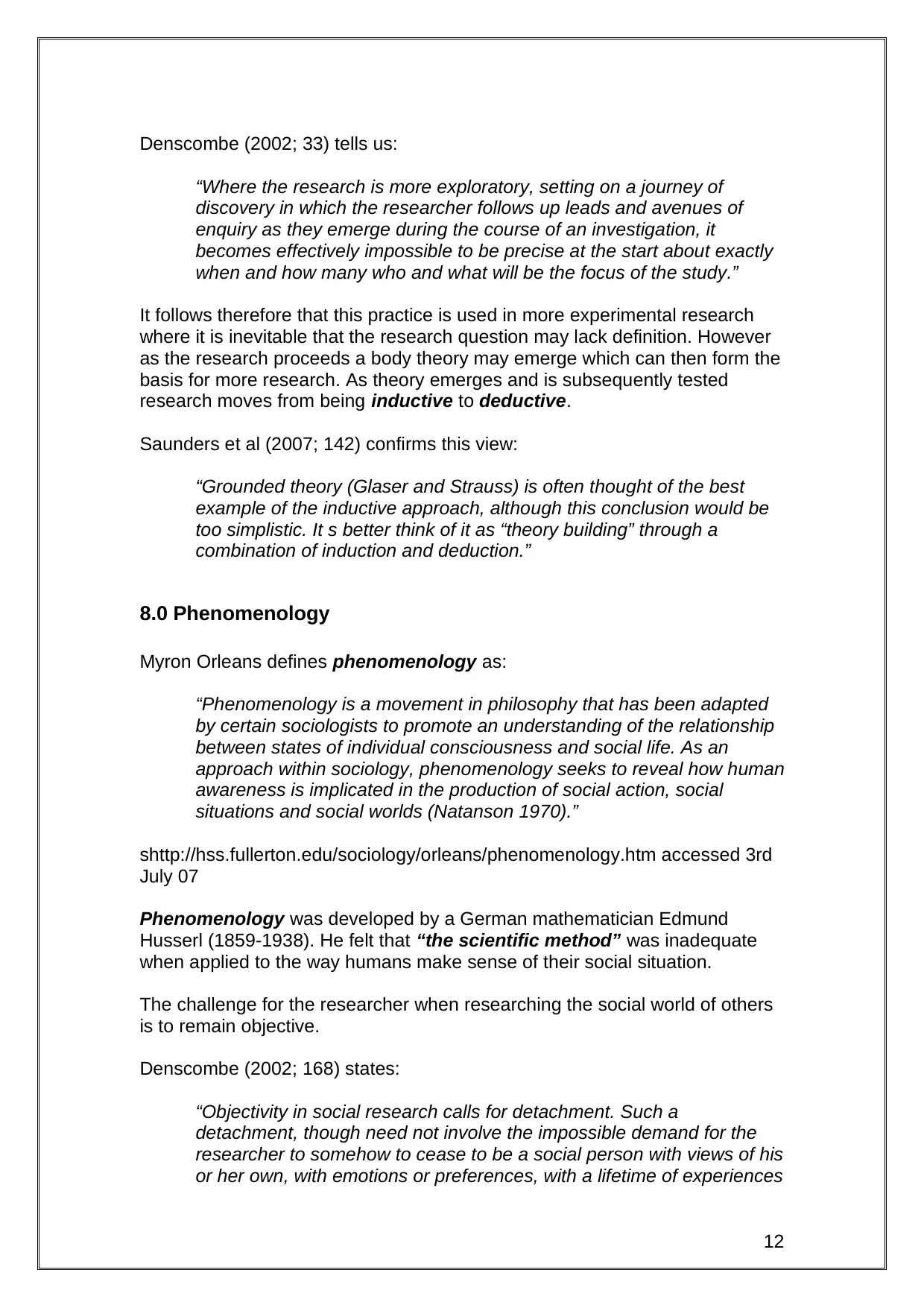
12
Denscombe (2002; 33) tells us:
“Where the research is more exploratory, setting on a journey of
discovery in which the researcher follows up leads and avenues of
enquiry as they emerge during the course of an investigation, it
becomes effectively impossible to be precise at the start about exactly
when and how many who and what will be the focus of the study.”
It follows therefore that this practice is used in more experimental research
where it is inevitable that the research question may lack definition. However
as the research proceeds a body theory may emerge which can then form the
basis for more research. As theory emerges and is subsequently tested
research moves from being inductive to deductive.
Saunders et al (2007; 142) confirms this view:
“Grounded theory (Glaser and Strauss) is often thought of the best
example of the inductive approach, although this conclusion would be
too simplistic. It s better think of it as “theory building” through a
combination of induction and deduction.”
8.0 Phenomenology
Myron Orleans defines phenomenology as:
“Phenomenology is a movement in philosophy that has been adapted
by certain sociologists to promote an understanding of the relationship
between states of individual consciousness and social life. As an
approach within sociology, phenomenology seeks to reveal how human
awareness is implicated in the production of social action, social
situations and social worlds (Natanson 1970).”
shttp://hss.fullerton.edu/sociology/orleans/phenomenology.htm accessed 3rd
July 07
Phenomenology was developed by a German mathematician Edmund
Husserl (1859-1938). He felt that “the scientific method” was inadequate
when applied to the way humans make sense of their social situation.
The challenge for the researcher when researching the social world of others
is to remain objective.
Denscombe (2002; 168) states:
“Objectivity in social research calls for detachment. Such a
detachment, though need not involve the impossible demand for the
researcher to somehow to cease to be a social person with views of his
or her own, with emotions or preferences, with a lifetime of experiences
Denscombe (2002; 33) tells us:
“Where the research is more exploratory, setting on a journey of
discovery in which the researcher follows up leads and avenues of
enquiry as they emerge during the course of an investigation, it
becomes effectively impossible to be precise at the start about exactly
when and how many who and what will be the focus of the study.”
It follows therefore that this practice is used in more experimental research
where it is inevitable that the research question may lack definition. However
as the research proceeds a body theory may emerge which can then form the
basis for more research. As theory emerges and is subsequently tested
research moves from being inductive to deductive.
Saunders et al (2007; 142) confirms this view:
“Grounded theory (Glaser and Strauss) is often thought of the best
example of the inductive approach, although this conclusion would be
too simplistic. It s better think of it as “theory building” through a
combination of induction and deduction.”
8.0 Phenomenology
Myron Orleans defines phenomenology as:
“Phenomenology is a movement in philosophy that has been adapted
by certain sociologists to promote an understanding of the relationship
between states of individual consciousness and social life. As an
approach within sociology, phenomenology seeks to reveal how human
awareness is implicated in the production of social action, social
situations and social worlds (Natanson 1970).”
shttp://hss.fullerton.edu/sociology/orleans/phenomenology.htm accessed 3rd
July 07
Phenomenology was developed by a German mathematician Edmund
Husserl (1859-1938). He felt that “the scientific method” was inadequate
when applied to the way humans make sense of their social situation.
The challenge for the researcher when researching the social world of others
is to remain objective.
Denscombe (2002; 168) states:
“Objectivity in social research calls for detachment. Such a
detachment, though need not involve the impossible demand for the
researcher to somehow to cease to be a social person with views of his
or her own, with emotions or preferences, with a lifetime of experiences
⊘ This is a preview!⊘
Do you want full access?
Subscribe today to unlock all pages.

Trusted by 1+ million students worldwide
1 out of 19
Related Documents
Your All-in-One AI-Powered Toolkit for Academic Success.
+13062052269
info@desklib.com
Available 24*7 on WhatsApp / Email
![[object Object]](/_next/static/media/star-bottom.7253800d.svg)
Unlock your academic potential
Copyright © 2020–2026 A2Z Services. All Rights Reserved. Developed and managed by ZUCOL.




